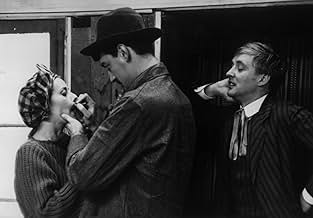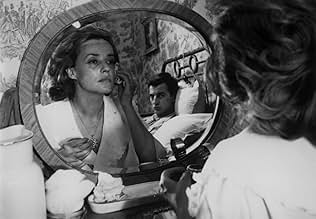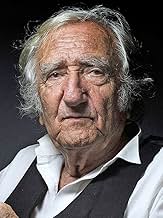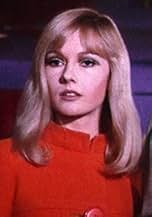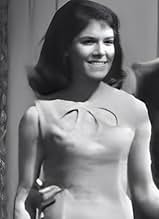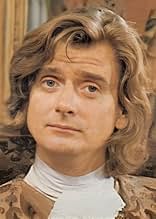Jules et Jim
- 1962
- Tous publics
- 1h 45min
NOTE IMDb
7,7/10
46 k
MA NOTE
Un triangle amoureux entre deux amis et une femme impulsive sur plusieurs décennies.Un triangle amoureux entre deux amis et une femme impulsive sur plusieurs décennies.Un triangle amoureux entre deux amis et une femme impulsive sur plusieurs décennies.
- Réalisation
- Scénario
- Casting principal
- Nomination aux 2 BAFTA Awards
- 3 victoires et 4 nominations au total
Oskar Werner
- Jules
- (as Oscar Werner)
Serge Rezvani
- Albert
- (as Bassiak)
Michel Subor
- Récitant
- (voix)
- …
Danielle Bassiak
- Compagnon d'Albert
- (non crédité)
Elen Bober
- Mathilde
- (non crédité)
Pierre Fabre
- Ivrogne in Cafe'
- (non crédité)
Dominique Lacarrière
- Une des femmes
- (non crédité)
Bernard Largemains
- Merlin
- (non crédité)
Kate Noelle
- Birgitta
- (non crédité)
Jean-Louis Richard
- Cliente au Cafe'
- (non crédité)
Michel Varesano
- Cliente au Cafe'
- (non crédité)
Christiane Wagner
- Helga
- (non crédité)
Avis à la une
Two lads from different backgrounds form a bond, a French boy with dark hair, an Austrian blond, quite Bohemian in their ways, taking pleasure all their days, and then Catherine makes it three, and waves her wand. Jim is smitten with this beauty and he falls, but then war breaks out, and homeland duty calls, so they marry, relocate, intense fighting means a break, she has a child, world reconciles, and bonds remake. Jules travels to the home of his two friends, where the triangle rotates, gyrates and bends, now he's coupled with Catherine, but Jim feels no chagrin, though it's clear this isn't where the story ends.
Jeanne Moreau is always outstanding!
Jeanne Moreau is always outstanding!
Jules (Oskar Werner), an introspective Austrian and Jim (Henri Serre) a confident Frenchman begin a friendship that defies understanding. What begins as an exchange and discourse over art develops into a bond that seems able to withstand anything, including fighting against each other in WWI. After the war has ended, the duo goes on sharing art and women with each other, until Jules falls in love with Catherine (Jeanne Moreau), a free-spirited woman with an unpredictable temperament, prone to emotional outbursts. Despite the easy-going inexperienced Jules being an odd fit for Catherine, he asks Jim not to chase Catherine, so he can have her love all to himself. Despite Jules' request, he invites Jim on many of the couple's outings and the trio spends most of their time together. Even after Catherine and Jules marry and have a child, Jim is invited to live in their home with them. Over time, an intimacy begins to develop between Jim and Catherine, which Jules is aware of. Instead of risking losing his friend or his marriage Jules allows the intimacy to blossom which creates a domino effect of emotions between the three of them. Life no longer is about what each wants individually, but rather what each other wants and expects and what kind of life they want the other to fulfill. The decision to allow the three-way relationship has enduring effects on all involved due to the complicated nature of the two men's love for Catherine, as well as their devotion to each other. Bonds will be tested, as Jules and Jim face another war, this time, off the battlefield.
"You said, "I love you," I said, "Wait." I was going to say, "Take me," you said, "Go away." Arguably the most memorable quote from Jules and Jim also acted as a heart-wrenching opening, conveying to the audience just how much of an emotional experience they were in for. As we are introduced to each character, Truffaut takes his deliberate time revealing what Jules and Jim mean to each other. It is Truffaut's prowess as a director that allows the audience to truly understand the depth of devotion that Jules and Jim share for each other. Without his labored efforts, the rest of the story would pass by unnoticed because this truly is a story about three people in love rather than a love triangle with each point seeking out the object of their affection. The story relies on the understanding that neither Jules, Jim, nor Catherine will seek to fulfill their own needs at the expense of each other. Technically, Truffaut showed mastery on only his third feature film. His use of freeze frames was fantastic and essential in allowing the audience to realize the profound effect on the emotional state of the men involved with Catherine, each "moved by a symbol they could not understand." Truffaut also uses the overlay technique a few times to great success, placing Catherine's face over a few scenes really driving home the idea that every thought or activity Jules and Jim ever took part in was driven by Catherine. In just three short years since his first feature, The 400 Blows--a masterpiece in its own right, Truffaut further revealed his mastery for capturing the complexity of human emotion like few others before him.
Few films tackle the emotionally intense themes Jules and Jim take on. Truffaut delves into pain, the kind of pain that is caused by yearning in love. Love and lust is a theme constantly at the forefront of the film, as well, along with a precise distinction between the two. Jules, lacking the romantic experience of Jim, attempts to shield Catherine from Jim for fear that he will only lust after her. When it becomes clear that Jim actually loves Catherine, as Jules does, he relents and decides to share his love of Catherine with Jim. Jules loves Catherine and shares a devotion to Jim, so he supports a union between Jim and Catherine because he needs to be a part of each's life and wants happiness for all parties involved, and vice-versa for Catherine and Jim. Devotion, like I have never since seen replicated on screen, is the driving force behind each character's actions and thoughts. The way Truffaut managed to capture that devoted motivation shows impeccable insight to the human spirit and cements him as the purest most personal filmmaker I have ever seen. Running the gamut of emotional commentary, Truffaut also successfully illustrates loneliness, especially experienced by Catherine, and its power over life. Catherine is clearly a damaged soul, she has met and overcome many obstacles in her life, most of which, are only alluded to. There are aspects of both Jules and Jim that she depends on for her very survival, necessitating that they both remain in her life. Catherine has been unable to commit to another due to her expectation of being abandoned, as only hinted to in a couple of scenes between her and Jules. It is this damage that makes her reckless and prompts Jules and Jim to be more cautious in their interactions with her. To be able to show every unlikeable aspect of a human being, yet, still endear that person in the hearts of the audience was a skill no one in the history of cinema has been more proficient at than Francois Truffaut. By the film's conclusion, we may not have that ending that leaves each better off and happy, but what we do get is the realization that we're all in search of our statue; that one person that is perfect to us and for us despite their obvious flaws, just as Jules and Jim traversed gardens in search of their statues before they happened upon the same one, and once we find that statue, we will do whatever it takes to keep it in our view.
"You said, "I love you," I said, "Wait." I was going to say, "Take me," you said, "Go away." Arguably the most memorable quote from Jules and Jim also acted as a heart-wrenching opening, conveying to the audience just how much of an emotional experience they were in for. As we are introduced to each character, Truffaut takes his deliberate time revealing what Jules and Jim mean to each other. It is Truffaut's prowess as a director that allows the audience to truly understand the depth of devotion that Jules and Jim share for each other. Without his labored efforts, the rest of the story would pass by unnoticed because this truly is a story about three people in love rather than a love triangle with each point seeking out the object of their affection. The story relies on the understanding that neither Jules, Jim, nor Catherine will seek to fulfill their own needs at the expense of each other. Technically, Truffaut showed mastery on only his third feature film. His use of freeze frames was fantastic and essential in allowing the audience to realize the profound effect on the emotional state of the men involved with Catherine, each "moved by a symbol they could not understand." Truffaut also uses the overlay technique a few times to great success, placing Catherine's face over a few scenes really driving home the idea that every thought or activity Jules and Jim ever took part in was driven by Catherine. In just three short years since his first feature, The 400 Blows--a masterpiece in its own right, Truffaut further revealed his mastery for capturing the complexity of human emotion like few others before him.
Few films tackle the emotionally intense themes Jules and Jim take on. Truffaut delves into pain, the kind of pain that is caused by yearning in love. Love and lust is a theme constantly at the forefront of the film, as well, along with a precise distinction between the two. Jules, lacking the romantic experience of Jim, attempts to shield Catherine from Jim for fear that he will only lust after her. When it becomes clear that Jim actually loves Catherine, as Jules does, he relents and decides to share his love of Catherine with Jim. Jules loves Catherine and shares a devotion to Jim, so he supports a union between Jim and Catherine because he needs to be a part of each's life and wants happiness for all parties involved, and vice-versa for Catherine and Jim. Devotion, like I have never since seen replicated on screen, is the driving force behind each character's actions and thoughts. The way Truffaut managed to capture that devoted motivation shows impeccable insight to the human spirit and cements him as the purest most personal filmmaker I have ever seen. Running the gamut of emotional commentary, Truffaut also successfully illustrates loneliness, especially experienced by Catherine, and its power over life. Catherine is clearly a damaged soul, she has met and overcome many obstacles in her life, most of which, are only alluded to. There are aspects of both Jules and Jim that she depends on for her very survival, necessitating that they both remain in her life. Catherine has been unable to commit to another due to her expectation of being abandoned, as only hinted to in a couple of scenes between her and Jules. It is this damage that makes her reckless and prompts Jules and Jim to be more cautious in their interactions with her. To be able to show every unlikeable aspect of a human being, yet, still endear that person in the hearts of the audience was a skill no one in the history of cinema has been more proficient at than Francois Truffaut. By the film's conclusion, we may not have that ending that leaves each better off and happy, but what we do get is the realization that we're all in search of our statue; that one person that is perfect to us and for us despite their obvious flaws, just as Jules and Jim traversed gardens in search of their statues before they happened upon the same one, and once we find that statue, we will do whatever it takes to keep it in our view.
Those with heavy sensibilities along the lines of conventional "morality" seem to have a hard time allowing themselves to enjoy this film for what it is: A beautiful visual poem about the passing of time and the progression and growth of an unusual friendship. This friendship may be unusual but feels completely natural and true. Jules and Jim if anything, exhibit great maturity in their relationship with each other and Catherine. It's refreshing to see a film dealing with a deep love, friendship and emotional bond between two males and a mutual love for a woman, without the usual competitiveness and controlling possessiveness that is the norm. Jules and Jim come off more as an enlightened pair. It seems understood among them there is no real belonging of one human being to another. Catherine's whims of the heart are discussed between them at every stage throughout the film and they are willing to accept them and love her for who she is as well as each other.
I do feel that this film lost it's pacing toward the end and seemed to speed up to conclusion. That being it's only flaw. Visually it is stunning. Francois Truffaut was a poet with the camera and his subtle nuances are captivating. The scenes of Jules, Jim and Catherine enjoying days together seem so natural and evoke the feel of wonderful days spent together among best friends that transported me back to days gone by.
"we met with a kiss/ a hit, then a miss/ and we parted/ we went our own ways/ in life's whirlpool of days/ around and around we go/ together bound/ together bound."
I do feel that this film lost it's pacing toward the end and seemed to speed up to conclusion. That being it's only flaw. Visually it is stunning. Francois Truffaut was a poet with the camera and his subtle nuances are captivating. The scenes of Jules, Jim and Catherine enjoying days together seem so natural and evoke the feel of wonderful days spent together among best friends that transported me back to days gone by.
"we met with a kiss/ a hit, then a miss/ and we parted/ we went our own ways/ in life's whirlpool of days/ around and around we go/ together bound/ together bound."
This is the first movie by Truffault I've ever seen, and I have to say I'm now very intrigued in his other work...
"Jules et Jim" is the story of two friends who meet a very beautiful and strange woman who turns up to be a bit unstable...
It starts with how they all meet each other and end up together... I thought the beginning was pretty fast as many things happened and you just wonder if the whole movie will be like that. Also I thought I didn't care much for any character, but of course it was too quick to judge. There is also a narrator (throughout the movie) and at first you ask yourself if its really necessary...
Still, when I decided to go grab a snack, I realized I was so hooked by the story that I couldn't. The characters behaved like no other I've seen and you find yourself wanting two different things: for it to end and for it never to end.
The movie has it's many twists for those who like, even a laugh here and there, but if you see it as a whole is a very deep description of the relationship between the three main characters.
The end is somehow beautiful, maybe because is "fair", maybe because is "real", maybe because is "surreal", you'll just have to watch and find out...
Is one of those movies when after watching it you understand both sides: those who say it's overrated and those who claim it's a masterpiece... to me it was a one in a lifetime film experience
"Jules et Jim" is the story of two friends who meet a very beautiful and strange woman who turns up to be a bit unstable...
It starts with how they all meet each other and end up together... I thought the beginning was pretty fast as many things happened and you just wonder if the whole movie will be like that. Also I thought I didn't care much for any character, but of course it was too quick to judge. There is also a narrator (throughout the movie) and at first you ask yourself if its really necessary...
Still, when I decided to go grab a snack, I realized I was so hooked by the story that I couldn't. The characters behaved like no other I've seen and you find yourself wanting two different things: for it to end and for it never to end.
The movie has it's many twists for those who like, even a laugh here and there, but if you see it as a whole is a very deep description of the relationship between the three main characters.
The end is somehow beautiful, maybe because is "fair", maybe because is "real", maybe because is "surreal", you'll just have to watch and find out...
Is one of those movies when after watching it you understand both sides: those who say it's overrated and those who claim it's a masterpiece... to me it was a one in a lifetime film experience
Jules et Jim is a difficult film, there's no question about that. I'd say the only thing that kept me watching was my love of Truffaut his ingenuity in cinematography, dialogue and just the whole tone of the film. That he could keep such melodramatic (if not drab) stuff somewhat entertaining is a testament to his mastery of the medium. I loved the blending of historical film into the narrative; I don't know if he was the first person to do this I highly doubt it but he certainly did it well in this picture.
Jules et Jim is a study of capriciousness. Catherine a woman to whom monogamy seems like a foreign concept is, to paraphrase the film, `not particularly intelligent, beautiful or kind, but she's treated like a queen.' Why Jules and Jim love her so, I don't know. They seem like strong enough characters to be without such a difficult woman, but I guess that question is at the center of the film.
For some reason, Jules et Jim reminded me of L'Avventura by Antonioni maybe because it was also a hard movie to enter and because the characters were so inaccessible. There are certainly elements of the neo-realism in this film, (one need look no further than the extensive use of mist and the forest scenes that closely resemble the dream sequences of Fellini, De Sica, et. al.)
Overall, I would say this picture is worthwhile, although there are certainly better, more accessible and mature Truffaut films out there.
Jules et Jim is a study of capriciousness. Catherine a woman to whom monogamy seems like a foreign concept is, to paraphrase the film, `not particularly intelligent, beautiful or kind, but she's treated like a queen.' Why Jules and Jim love her so, I don't know. They seem like strong enough characters to be without such a difficult woman, but I guess that question is at the center of the film.
For some reason, Jules et Jim reminded me of L'Avventura by Antonioni maybe because it was also a hard movie to enter and because the characters were so inaccessible. There are certainly elements of the neo-realism in this film, (one need look no further than the extensive use of mist and the forest scenes that closely resemble the dream sequences of Fellini, De Sica, et. al.)
Overall, I would say this picture is worthwhile, although there are certainly better, more accessible and mature Truffaut films out there.
Le saviez-vous
- AnecdotesHenri-Pierre Roché's original novel was based on his own experiences as a young man. The original Catherine was still alive when the film was released and even attended the premiere incognito.
- GaffesWhen Catherine lights the letters on fire, they are at first away from her dress, but in the next shot they are burning on top of her dress.
- Versions alternativesThe Criterion Region 1 disc and the Tartan Region 2 DVD have a scene in which the film is reversed left/right. When Jules, Jim, and Albert are sitting on the grass sharing stories about the war, the order of the three characters repeatedly changes between shots. This does not occur in other DVD releases of this film, including the Fox/Lorber Region 1 release.
- ConnexionsEdited into Laggiù qualcuno mi ama (2023)
Meilleurs choix
Connectez-vous pour évaluer et suivre la liste de favoris afin de recevoir des recommandations personnalisées
- How long is Jules and Jim?Alimenté par Alexa
Détails
- Date de sortie
- Pays d’origine
- Langues
- Aussi connu sous le nom de
- Jules and Jim
- Lieux de tournage
- Sociétés de production
- Voir plus de crédits d'entreprise sur IMDbPro
Box-office
- Montant brut aux États-Unis et au Canada
- 509 $US
- Week-end de sortie aux États-Unis et au Canada
- 11 206 $US
- 25 avr. 1999
- Montant brut mondial
- 496 383 $US
- Durée1 heure 45 minutes
- Couleur
- Mixage
- Rapport de forme
- 2.35 : 1
Contribuer à cette page
Suggérer une modification ou ajouter du contenu manquant

Lacune principale
By what name was Jules et Jim (1962) officially released in India in English?
Répondre
![Regarder Bande-annonce [OV]](https://m.media-amazon.com/images/M/MV5BMWM5OGI0MjUtZDRhMC00ZGQ1LTk0NWEtMWMzZDFhMjA1OTk1XkEyXkFqcGdeQXRodW1ibmFpbC1pbml0aWFsaXplcg@@._V1_QL75_UX500_CR0)
